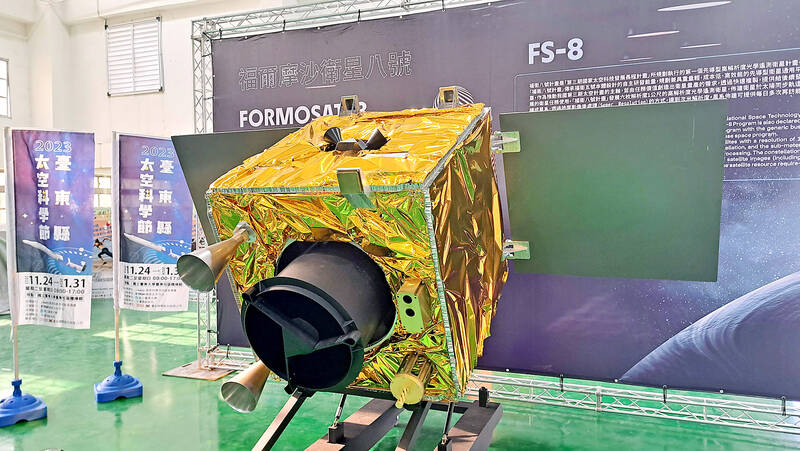The Formosat-8 satellite program would be equipped with eight Taiwan-made high-resolution optical remote sensing satellites and an artificial intelligence (AI) system, with one satellite launched annually over the next seven years, the Taiwan Space Agency (TASA) said.
In its draft of the third phase of the national space technology development project, which was submitted to the Executive Yuan at the end of last month, the National Science and Technology Council proposed to extend the project’s expiration date from 2028 to 2031, with the funding for the project expanding to NT$40 billion (US$1.2 billion).
The main tasks of the project would be to develop high-resolution optical remote sensing satellites and low Earth orbit satellites. The Formosat-8 is a pilot project for high-resolution optical remote sensing satellites, which would also be the nation’s first satellite equipped with an AI system.

Photo: Huang Ming-tang, Taipei Times
Based on TASA’s plan, Formosat-8, like Formosat-5, would be a light, low-cost, but highly efficient satellite platform designed and developed by Taiwanese engineers. Formosat-8 project manager Cynthia Liu (劉小菁) said the project would build a total of eight remote sensing satellites, with six of them having the ability to capture high-resolution images of objects 1m above ground from an altitude of about 561km.
“Post-processing” of the satellite images would show those of items 0.7m above ground, Liu said, adding that the resolution of the last two satellites would allow them to capture images under 1m above ground, she said.
The first remote sensing satellite — FS-8A — has completed a thermal vacuum test, Liu said, adding that it is scheduled to be launched into space in the fourth quarter of this year on a SpaceX rocket.
One satellite would be launched annually over the next seven years, she said.
The National Atomic Research Institute has also been researching the development of domestically produced solar cells, which are scheduled to be launched into space along with a second remote-sensing satellite in 2027.
If the solar cells are certified, the percentage of the satellite components made in Taiwan would be increased, Liu said.
“As countries around the world step up competition in the space age, solar panels that could be used in space are expected to be in high demand, she said.
“If we have the technology, we can develop the space industry further, and more countries would place orders for Taiwan-made solar cells,” she added.

Taiwan has received more than US$70 million in royalties as of the end of last year from developing the F-16V jet as countries worldwide purchase or upgrade to this popular model, government and military officials said on Saturday. Taiwan funded the development of the F-16V jet and ended up the sole investor as other countries withdrew from the program. Now the F-16V is increasingly popular and countries must pay Taiwan a percentage in royalties when they purchase new F-16V aircraft or upgrade older F-16 models. The next five years are expected to be the peak for these royalties, with Taiwan potentially earning

STAY IN YOUR LANE: As the US and Israel attack Iran, the ministry has warned China not to overstep by including Taiwanese citizens in its evacuation orders The Ministry of Foreign Affairs (MOFA) yesterday rebuked a statement by China’s embassy in Israel that it would evacuate Taiwanese holders of Chinese travel documents from Israel amid the latter’s escalating conflict with Iran. Tensions have risen across the Middle East in the wake of US and Israeli airstrikes on Iran beginning Saturday. China subsequently issued an evacuation notice for its citizens. In a news release, the Chinese embassy in Israel said holders of “Taiwan compatriot permits (台胞證)” issued to Taiwanese nationals by Chinese authorities for travel to China — could register for evacuation to Egypt. In Taipei, the ministry yesterday said Taiwan

Taiwan is awaiting official notification from the US regarding the status of the Agreement on Reciprocal Trade (ART) after the US Supreme Court ruled US President Donald Trump's global tariffs unconstitutional. Speaking to reporters before a legislative hearing today, Premier Cho Jung-tai (卓榮泰) said that Taiwan's negotiation team remains focused on ensuring that the bilateral trade deal remains intact despite the legal challenge to Trump's tariff policy. "The US has pledged to notify its trade partners once the subsequent administrative and legal processes are finalized, and that certainly includes Taiwan," Cho said when asked about opposition parties’ doubts that the ART was

If China chose to invade Taiwan tomorrow, it would only have to sever three undersea fiber-optic cable clusters to cause a data blackout, Jason Hsu (許毓仁), a senior fellow at the Hudson Institute and former Chinese Nationalist Party (KMT) legislator, told a US security panel yesterday. In a Taiwan contingency, cable disruption would be one of the earliest preinvasion actions and the signal that escalation had begun, he said, adding that Taiwan’s current cable repair capabilities are insufficient. The US-China Economic and Security Review Commission (USCC) yesterday held a hearing on US-China Competition Under the Sea, with Hsu speaking on